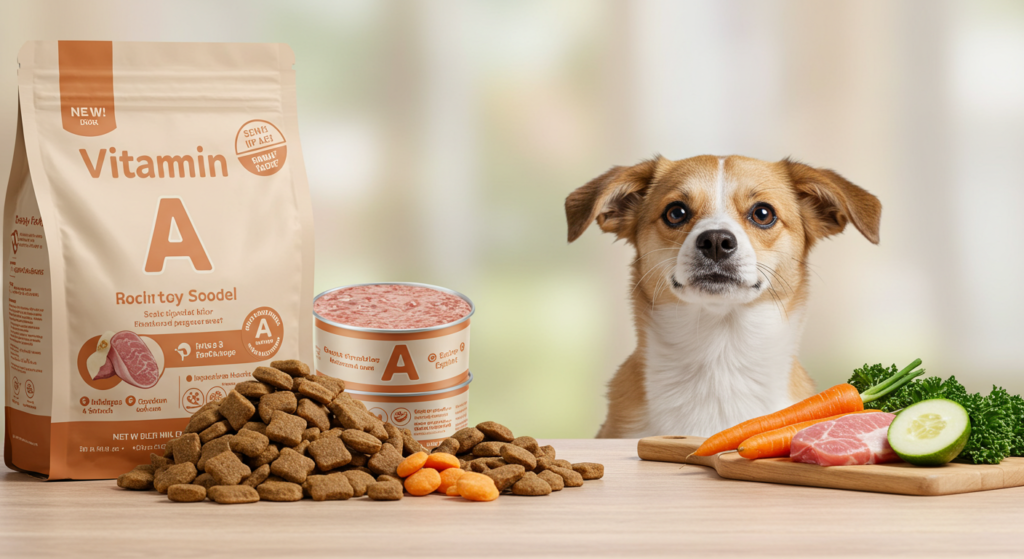Table of Contents
- Introduction
- The Role of Vitamin A in Pet Nutrition
- Sources of Vitamin A for Dogs and Cats
- Health Benefits of Vitamin A for Pets
- Vision Support
- Growth and Development
- Immune System Function
- Vitamin A Deficiency in Pets
- Conclusion
- FAQs
- Tag List
- Meta Description
Introduction
Pet owners often wonder what makes a high-quality diet for their furry companions. With so much information available online, it can be challenging to separate facts from myths. The Pet Food Institute (PFI) is here to help! In this blog series, we’ll explore pet food from A to Z, starting with Vitamin A—a vital nutrient for dogs and cats. Learn how this essential vitamin supports your pet’s health, where it comes from, and why it’s a cornerstone of complete and balanced pet food.

The Role of Vitamin A in Pet Nutrition
Vitamin A is one of over 40 essential nutrients identified by veterinary researchers for dogs and cats. These nutrients, including proteins, fats, minerals, and vitamins, are crucial for pets at every life stage. They support early development, daily bodily functions, and long-term health.
Vitamin A is a fat-soluble vitamin, meaning it’s stored in the liver until the body needs it. It acts as a powerful antioxidant and plays a key role in maintaining healthy vision, skin, and immune function.
Sources of Vitamin A for Dogs and Cats
Vitamin A comes in two primary forms:
- Carotenoids: Found in yellow, orange, and red fruits and vegetables like sweet potatoes, carrots, and dark leafy greens. Dogs, being omnivores, can convert carotenoids into usable Vitamin A.
- Retinoids: Found in animal-based ingredients like liver and fish oil. Cats, as obligate carnivores, rely on retinoids (such as retinyl palmitate) for their Vitamin A needs.
Most commercial pet foods are formulated to provide the right balance of these sources, ensuring pets get the Vitamin A they need.
Health Benefits of Vitamin A for Pets
1. Vision Support
Vitamin A is essential for maintaining healthy eyesight, particularly night vision. It supports the production of pigments that help eyes adjust to light changes. A deficiency in Vitamin A can lead to night blindness in pets.
2. Growth and Development
Vitamin A plays a critical role in the growth and development of puppies and kittens. It supports organ formation, muscle strength, and nervous system health. Newborn pets rely on their mother’s colostrum, which is rich in Vitamin A, for their initial supply.
3. Immune System Function
Vitamin A helps produce white blood cells, which are vital for fighting infections and maintaining overall health. It strengthens the immune system, helping pets combat viruses and bacteria effectively.
Vitamin A Deficiency in Pets
A lack of Vitamin A can lead to serious health issues:
- Puppies and Kittens: Stunted growth, muscle weakness, nervous system disorders, and poor skin and coat quality.
- Adult Pets: Reproductive issues, such as improper ovulation in females and sterility in males.
To prevent deficiencies, ensure your pet’s diet includes a complete and balanced formula tailored to their life stage.
Conclusion
Vitamin A is a cornerstone of pet nutrition, supporting vision, growth, and immune health. Whether your pet is a dog or a cat, ensuring they receive the right amount of Vitamin A is essential for their overall well-being. By choosing high-quality, complete, and balanced pet food, you can provide your furry friend with the nutrients they need to thrive.

FAQs
1. Can I give my pet human Vitamin A supplements?
No. Human supplements may contain inappropriate doses or ingredients for pets. Always consult your veterinarian before adding supplements to your pet’s diet.
2. How do I know if my pet is getting enough Vitamin A?
Feeding a complete and balanced commercial pet food formulated for your pet’s life stage is the best way to ensure they receive adequate Vitamin A.
3. Are there risks of too much Vitamin A?
Yes, excessive Vitamin A can lead to toxicity, especially in cats. Symptoms include lethargy, weight loss, and bone deformities. Stick to recommended dietary guidelines.
4. Can cats get Vitamin A from plant sources?
No, cats cannot convert carotenoids into usable Vitamin A. They require animal-based retinoids, such as those found in liver or fish oil.
